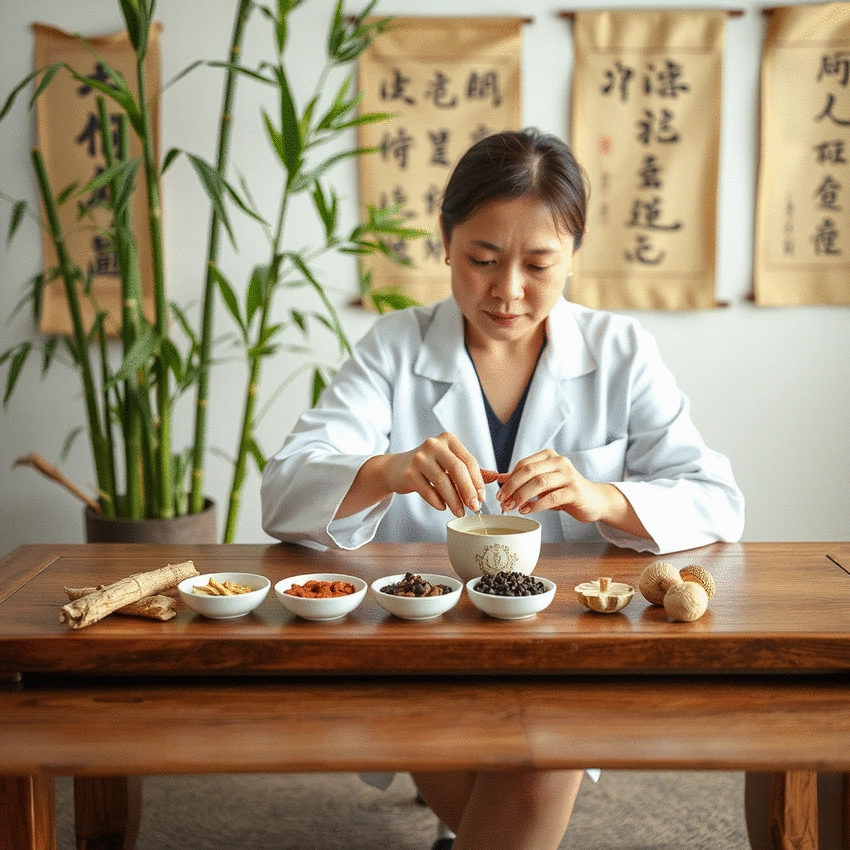Balancing Qi Through Seasonal Practices
By Kiran Wu / Feb 28
Did you know that the concept of vital energy, or qi, is at the heart of Traditional Chinese Medicine (TCM)? This ancient practice emphasizes the balance and flow of qi as essential for maintaining good health. Understanding how to harness this energy can lead to profound changes in your well-being.
Implementing various practices can lead to a healthier and more balanced life. Below are the essential methods to enhance your qi. For more insights into how these practices affect your energy, consider exploring how energy flow and acupuncture treatment intersect.
Targeting specific points to release blockages.
Utilizing massage techniques to enhance energy flow.
Incorporating natural remedies tailored to your needs.
Engaging in Tai Chi and Qigong to cultivate energy.
Applying heat to stimulate specific points for strength.
Nourishing your body with the right foods to support qi.
Techniques to calm the mind and regulate qi flow.
Welcome to the fascinating world of Traditional Chinese Medicine (TCM), where the concept of qi plays a central role. Qi, often translated as "vital energy," is the life force that flows through all living things. Just like the gentle breeze that stirs the branches of a tree, our bodies are animated by this dynamic energy. When our qi is balanced and flowing freely, we experience good health and vitality. However, when qi is blocked or deficient, it can lead to discomfort and illness.
At The Meridian Connection, my mission is to help you understand the importance of qi and its impact on your overall well-being. By exploring the different aspects of qi, we can uncover how to harness this energy to enhance our health. Are you ready to embark on this journey? Let’s dive deeper into the fascinating concept of qi! For a deeper dive into the foundational aspects of this practice, read more about understanding acupuncture and meridians.
Understanding qi involves recognizing its different types and their significance in our lives. In TCM, qi is not just one single form; it encompasses various types that serve distinct roles within our bodies. The primary types of qi include Yuan Qi, the original energy we are born with, and Wei Qi, which serves as our body's protective energy, akin to a shield against external threats.
Recognizing these types of qi not only enriches our understanding but also reveals how they interact to promote wellness. For example, a deficiency in Yuan Qi may lead to fatigue, while an imbalance in Wei Qi can make us more susceptible to infections. Exploring these connections is vital for achieving a harmonious state of health.
To define qi is to delve into the very essence of life itself. Qi is often perceived as an invisible force, but its presence can be felt through our emotions, physical sensations, and even our thoughts. Think of it as the underlying energy that fuels every cell in our bodies. When we feel energized and alive, our qi is abundant and flowing.
Conversely, when we experience stress or illness, our qi may become stagnant, leading to feelings of unease and discomfort. This is why understanding and nurturing our qi is essential for living a balanced life. Are you curious about how to support your qi? The journey toward balance starts with awareness and connection to our own energy!
As we explore the different types of qi, it becomes clear that each has a unique role in maintaining our health. Here are some key types to consider:
Understanding these types of qi allows us to identify where our energy may be lacking or blocked. For instance, if you frequently catch colds, it may indicate a weakness in your Wei Qi. By acknowledging these signs, we can take proactive steps to nurture our qi and enhance our health.
In TCM, understanding qi goes hand in hand with the foundational theories that shape our approach to health. One of the most important concepts is the Yin-Yang philosophy, which emphasizes the balance of opposing forces in our lives. Just as day and night coexist in harmony, our bodies need a delicate balance of yin (cool, passive energy) and yang (active, warm energy) to function optimally.
Another key aspect is the Five Elements theory, which connects our health to the natural world. Each element—Wood, Fire, Earth, Metal, and Water—corresponds to specific emotions, organs, and seasons, providing a holistic framework for understanding qi and health.
By incorporating the principles of these foundational theories, we can better understand how to maintain our qi balance and achieve holistic wellness.
Did you know? One of the simplest ways to enhance your qi is through mindful breathing. By taking just a few moments each day to practice deep, conscious breathing, you can help clear blockages and promote a smoother flow of energy. Try inhaling deeply through your nose, holding for a few seconds, and exhaling slowly through your mouth. This practice not only calms the mind but also revitalizes your body's vital energy!
As we wrap up our exploration of Traditional Chinese Medicine (TCM) practices for achieving qi balance, it's essential to highlight the main takeaways. Understanding and implementing these practices can profoundly impact our overall health and well-being. Each element plays a role in restoring and maintaining that vital energy flow, leading to a more harmonious life.
At The Meridian Connection, I believe in the power of a holistic approach when it comes to wellness. This means recognizing that each part of our lives—from physical health to emotional states—interconnects. By nurturing these connections, we can foster an environment where qi flows freely, allowing us to thrive.
To maintain a balanced qi, several core practices stand out in Traditional Chinese Medicine. Embracing these methods can guide you toward a healthier existence:
Implementing these practices can help create a balanced lifestyle where wellness is attainable. These methods are not just about physical health; they also encompass emotional and mental well-being, reinforcing the interconnectedness I often discuss in my practice. For more on this, explore how to achieve balancing qi for better health.
It's crucial to recognize that TCM isn’t a one-size-fits-all solution. Each person's journey toward qi balance is unique, shaped by individual experiences and needs. By understanding the principles of TCM, we can tailor our practices to create a personalized approach that resonates with our specific challenges and goals.
Consider the idea of balance in life and how it reflects in your qi. When we make choices that enhance our physical, emotional, and spiritual health, we pave the way for a more fulfilling existence. I encourage you to reflect on your current practices and consider the small adjustments you can make to support your unique journey.
Integrating TCM practices into your daily routine can feel like a natural extension of self-care. Here are a few simple ways to start:
As you explore these practices, remember that consistency is key. Each small change adds up, contributing to a healthier and more balanced life. By embracing TCM and its principles, you are taking an important step towards cultivating a vibrant and energetic existence. Let’s keep this conversation going—what practices resonate most with you?
As you embark on your journey toward understanding and incorporating TCM practices, there are several pathways to further engage with this wisdom. Whether you are new to TCM or looking to deepen your knowledge, knowing how to move forward is crucial.
Connecting with a TCM practitioner can provide invaluable insights tailored to your personal health journey. I always recommend finding someone who resonates with you and your goals, as this connection can make all the difference in your experience.
When seeking out a TCM practitioner, consider a few important factors to ensure you find the right fit:
In your first consultation, don’t hesitate to ask questions that will help you understand their methods and how they can support your journey. This openness will help build a strong relationship, allowing for a more tailored approach to your healing. For further reading, delving into qi balance in traditional medicine provides additional context.
Here are some questions to consider when meeting with a TCM practitioner:
These questions can help facilitate an open dialogue that enriches your understanding of TCM and your personal path to qi balance.
After your consultation, there are many resources available to help you delve deeper into TCM practices. Whether through books, online courses, or community workshops, each resource can be a stepping stone towards enhancing your knowledge and experience.
Additionally, seeking community support can provide motivation and encouragement along the way. Connecting with others who are also exploring TCM can foster a sense of belonging and shared learning. Here are a few ways to engage:
As I continue to share insights through The Meridian Connection, I invite you to embark on this journey with me. Together, we can explore the fascinating world of TCM and its profound impact on our health and well-being. What steps will you take next to embrace your journey toward balance? You might find further insights by exploring meridians and acupuncture treatment outcomes.
Here is a quick recap of the important points discussed in the article:

 Balancing Qi Through Seasonal Practices
As the seasons change, so do our bodies and minds. The ancient wisdom of Traditional Chinese Medicin
Balancing Qi Through Seasonal Practices
As the seasons change, so do our bodies and minds. The ancient wisdom of Traditional Chinese Medicin
 Meridians and Chronic Pain Explained
Have you ever considered how ancient wisdom can illuminate modern health challenges? The fascinating
Meridians and Chronic Pain Explained
Have you ever considered how ancient wisdom can illuminate modern health challenges? The fascinating
 Meridian Blockages and Health Effects
Have you ever considered how the flow of energy within your body can impact your overall well-being?
Meridian Blockages and Health Effects
Have you ever considered how the flow of energy within your body can impact your overall well-being?